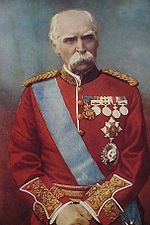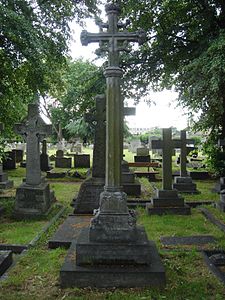- Sir Donald Stewart, 1st Baronet
-
Sir Donald Stewart 
Sir Donald StewartBorn 1 March 1824
Forres, MorayDied 26 March 1900 (aged 76)
Algiers, AlgeriaBuried at Brompton Cemetery Allegiance  United Kingdom
United KingdomService/branch  British Army
British ArmyRank Field Marshal Commands held Indian Army Battles/wars Indian rebellion of 1857
Second Anglo-Afghan WarAwards Knight Grand Cross of the Order of the Bath
Knight Grand Commander of the Order of the Star of India
Companion of the Order of the Indian EmpireField Marshal Sir Donald Martin Stewart, 1st Baronet, GCB GCSI CIE (1 March 1824 – 26 March 1900) was a British field marshal. He was for five years Commander-in-Chief, India, and afterwards a member of the Council of the Secretary of State for India.
Contents
Early life
He was the son of Robert Stewart, and born at Mount Pleasant, near Forres, Moray, Scotland. He was educated at schools at Findhorn, Dufftown and Elgin and at the University of Aberdeen.[1]
Career
Stewart was commissioned into the Bengal Army in 1840,[2] and served in 1854 and 1855 in the frontier expeditions against the Mohmands.[2]
In the Indian rebellion of 1857 Stewart, after a famous ride from Agra to Delhi with dispatches, served on the staff at the siege and capture of Delhi[2] and of Lucknow,[2] and afterwards through the campaign in Rohilkhand (medal and two clasps, and brevetmajor and lieutenant-colonel). For nine years he was assistant and deputy-adjutant-general of the Bengal army,[2] commanded the Bengal brigade in the Abyssinian expedition in 1867 (medal and CB),[2] and became a major-general in 1868.[2] He reorganized the penal settlement of the Andaman Islands, where he was commandant[3] when Lord Mayo, British Viceroy of India, was assassinated (1872), and, after holding the Lahore command,[3] was promoted lieutenant-general in 1877.[3]
In 1878, Stewart commanded the Kandahar field force in the Second Anglo-Afghan War[3] (KCB and thanks of Parliament). For this campaign, Stewart assembled the Kandahar Field Force, some 13,000 men, at Multan in the Punjab. He then advanced through the Bolan Pass to Quetta, and then on to Kandahar. Although this advance was uncontested, his men found it tough going because of the extremes of both terrain and climate. He reached Kandahar on 8 January 1879 to find the Afghan garrison there had fled.
In March 1880, he made a difficult march from Kandahar to Kabul, fighting on the way the battles of Ahmed Khel[3] and Arzu,[3] and held supreme military and civil command in northern Afghanistan.[3] On hearing of the Maiwand disaster, he despatched Sir Frederick Roberts with a division on his celebrated march from Kabul to Kandahar, while he led the rest of the army back to India through the Khyber Pass (medal with clasp, GCB, CIE, baronetcy, and thanks of Parliament). Promoted general in 1881,[3] he was for five years Commander-in-Chief, India,[3] and afterwards a member of the Council of the Secretary of State for India until his death.[3]
Stewart was made GCSI in 1885 and promoted to Field Marshal in 1894.[3] He was Governor of the Royal Hospital Chelsea from 1895[4] to 1901.[5]
Stewart died at Algiers, Algeria in 1900, and is buried in Brompton Cemetery in London.[6]
Family
In 1847 he married Davina Marine; they went on to have two sons and three daughters.[2]
References
- ^ George Robert Elsmie, ed., Field-Marshal Sir Donald Stewart: G.C.B., G.C.S.L., C.I.E.; an account of his life, mainly in his own words, London, John Murray (1903). On line, Internet Archive.
- ^ a b c d e f g h Heathcote, p. 270
- ^ a b c d e f g h i j k Heathcote, p. 271
- ^ London Gazette: no. 26618. p. 2354. 23 April 1895. Retrieved 2010-01-30.
- ^ London Gazette: no. 27319. p. 3697. 31 May 1901. Retrieved 2010-01-30.
- ^ Elsmie, as cited, pp. 443-4.
- Heathcote, T. A., The British Field Marshals 1736 - 1997, Leo Cooper, 1999, ISBN 0 850526965
 This article incorporates text from a publication now in the public domain: Chisholm, Hugh, ed (1911). Encyclopædia Britannica (11th ed.). Cambridge University Press.
This article incorporates text from a publication now in the public domain: Chisholm, Hugh, ed (1911). Encyclopædia Britannica (11th ed.). Cambridge University Press.- Leigh Rayment's List of Baronets
External links
Government offices Preceded by
F. L. Playfair
as Superintendent of Port BlairChief Commissioner of the Andaman and Nicobar Islands
1872–1875Succeeded by
Charles Arthur BarwellMilitary offices Preceded by
Sir Frederick HainesCommander-in-Chief, India
1881–1885Succeeded by
The Earl RobertsHonorary titles Preceded by
Sir Patrick GrantGovernor, Royal Hospital Chelsea
1895–1901Succeeded by
Sir Henry NormanCategories:- 1824 births
- 1900 deaths
- British Field Marshals
- British military personnel of the Second Anglo-Afghan War
- British military personnel of the Indian Rebellion of 1857
- British Commander-in-Chiefs of India
- Baronets in the Baronetage of the United Kingdom
- British Indian Army generals
- British East India Company Army officers
- Companions of the Order of the Indian Empire
- Knights Grand Cross of the Order of the Bath
- Knights Grand Commander of the Order of the Star of India
- People from Moray
- Scottish soldiers
- Alumni of the University of Aberdeen
- Burials at Brompton Cemetery
- British military personnel of the Abyssinian War
Wikimedia Foundation. 2010.

